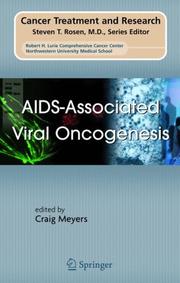| Listing 1 - 2 of 2 |
Sort by
|

ISBN: 1280902361 9786610902361 0387468161 0387468048 Year: 2007 Publisher: New York : Springer,
Abstract | Keywords | Export | Availability | Bookmark
 Loading...
Loading...Choose an application
- Reference Manager
- EndNote
- RefWorks (Direct export to RefWorks)
AIDS-associated viral oncology is a significant healthcare problem. Since the identification of human immunodeficiency virus (HIV)-associated acquired immune disease syndrome (AIDS), the role of viruses in human cancers has become acutely apparent over the past twenty years. The understanding and treatment of AIDS-associated cancers has become a major concern among healthcare organizations. Human cancers that were once rare in the population have now become common within the HIV infected population. Experts share their collective knowledge and examine the clinical and biological aspects, including viruses well established in their roles, as well as emerging new viruses. This volume will be a resource for both members of the scientific and healthcare community and active researchers in this field. ************************************************************************ "Human immunodeficiency virus (HIV) - associated acquired immune disease syndrome (AIDS) places individuals at increased risk for virally mediated cancers. This text addresses the clinical and biological aspects of this topic. Distinguished investigators in the field present a comprehensive overview with relevance to laboratory scientists and practicing clinicians." Steven T. Rosen, M.D. Series Editor.
AIDS malignancies. --- Viral carcinogenesis. --- Microbial carcinogenesis --- Oncogenic viruses --- AIDS-associated malignancies --- AIDS malignancy --- AIDS oncology --- AIDS-related cancer --- AIDS-related malignancies --- AIDS (Disease) --- Cancer --- Complications
Book
ISBN: 1493908596 1493908588 1322133018 Year: 2014 Publisher: New York, NY : Springer New York : Imprint: Springer,
Abstract | Keywords | Export | Availability | Bookmark
 Loading...
Loading...Choose an application
- Reference Manager
- EndNote
- RefWorks (Direct export to RefWorks)
The association between AIDS and cancer was recognized from the beginning of the AIDS epidemic, when the appearance of Kaposi sarcoma in a cluster of young men was one of the first signs of this new disease. It was soon recognized that AIDS patients are prone to develop a number of “AIDS-defining” cancers: Kaposi sarcoma, lymphoma, and cervical cancer. The development of effective combination anti-HIV therapy starting around 1996 converted AIDS from a death sentence to a manageable disease and led to dramatic shifts in the epidemic. As this therapy was able to improve immune function in patients, the incidence of most “AIDS-defining” cancers decreased. There is a misconception, however, that AIDS has gone away. In fact, as AIDS patients are living longer, the number of AIDS patients has more than doubled in the United States since 1996, and the AIDS population overall has increased in age. Also, as AIDS patients are less likely to die of other complications, cancer is coming to the forefront as one of the most common causes of death in regions where AIDS drugs are widely available. Moreover, the three “AIDS-defining” cancers are now taking a back seat toa number of other HIV-associated cancers, such as Hodgkin lymphoma, lung cancer, and anal cancer. In the developing world, AIDS-associated cancers are a major public health problem, and in some regions of sub-Saharan Africa, Kaposi sarcoma is the most common tumor in men. In recent years, there has been a vast increase in our understanding of HIV-associated cancers. We now know, for example, that most are caused by other viruses and that the main role of HIV and immunodeficiency is to provide a supportive environment for the viruses to multiply and for the cancers to develop. But there remain a number of unanswered questions and a need for improved prevention and therapy. In the 28chapters of this book, written by some of the most renowned experts in this field, we present up-to-date information on the cancers associated with HIV infection. The chapters cover the epidemiology of these cancers, as well as their pathogenesis, clinical presentation, and treatment. Dr. Robert Yarchoanis the Director of the Office of HIV and AIDS Malignancy and Chief of the HIV and AIDS Malignancy Branch in the National Cancer Institute. He played a major role in developing the first AIDS drugs. His research is now focused on AIDS-related cancers, especially Kaposi sarcoma and other cancers caused by Kaposi sarcoma-associated herpesvirus.
AIDS malignancies. --- HIV infections --- Complications. --- AIDS-associated malignancies --- AIDS malignancy --- AIDS oncology --- AIDS-related cancer --- AIDS-related malignancies --- AIDS (Disease) --- Cancer --- Complications --- Immunology. --- Medical virology. --- Emerging infectious diseases. --- Oncology . --- Virology. --- Infectious Diseases. --- Oncology. --- Tumors --- Emerging infections --- New infectious diseases --- Re-emerging infectious diseases --- Reemerging infectious diseases --- Communicable diseases --- Medical microbiology --- Virology --- Virus diseases --- Immunobiology --- Life sciences --- Serology --- Infectious diseases. --- Microbiology
| Listing 1 - 2 of 2 |
Sort by
|

 Search
Search Feedback
Feedback About UniCat
About UniCat  Help
Help News
News